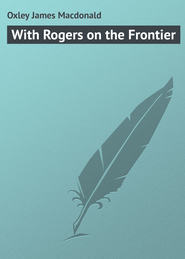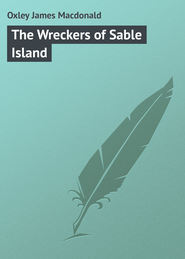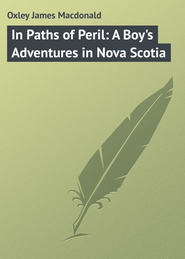По всем вопросам обращайтесь на: info@litportal.ru
(©) 2003-2024.
✖
My Strange Rescue and other stories of Sport and Adventure in Canada
Настройки чтения
Размер шрифта
Высота строк
Поля
Although it was mid-day now, intense darkness filled my prison cell, and the air was close and foul, for Bruin had evidently been tenant of the place all winter.
For some time I could do nothing but gaze at the little patch of blue sky above me that seemed so hopelessly far away, as if rescue must soon come from thence. I could faintly hear poor Tiger's barking still, and fearing he might go off in search of me, I kicked and pounded against the sides of the tree, shouting at the top of my voice.
I don't know whether he could hear me, but he did not go away at all events. It would have been far better for him, poor fellow, if he had.
After some minutes the first bewildering paroxysm of fright abated, and I set myself seriously to consider what was to be done. I could not give up all hope of escape, desperate as my case seemed, and I felt sure I would lose my mind if I did not keep myself constantly employed in some way.
There seemed but one thing to do, and to that I forthwith applied myself. In my belt hung my strong, keen-edged hunting-knife. Since I could not climb out of my prison, perhaps I could cut my way out. So drawing the knife, I set to work with tremendous vigour.
At first it was easy enough, for the soft decayed wood offered little opposition to my keen blade, and I felt encouraged. But presently I reached the hard rind, and then had to go warily for fear of snapping the steel off short.
The close confinement, the heavy, poisonous air, and the constrained position the work required, all told hard upon me; but I toiled away with the determination of despair.
I must have spent at least an hour thus, when, to my delight, a hard blow sent the knife-blade clean through the wood, and on drawing it back a blessed little bit of daylight peeped through, which made a new man of me.
At it I went again, and paused not this time until I had a jagged hole chipped out through which I could put my hand. If the bear did not come for a couple of hours more I would be free.
The moment I put out my hand Tiger caught sight of it, and came leaping up against the tree, wild with delight at finding me again, for now of course I could easily make him hear iny voice.
A few minutes' rest and the breathing of the pure, fresh air that streamed in through the opening, and chip, chip, chip, I cut away at the hard wood until a hole as big as my face was made.
Another brief rest, for I was getting very tired, when – ah, what is the matter? Why is Tiger barking so madly? Can it be that the bear is returning? Yes, there he comes!
He was half-way across the glade already, and Tiger, trembling with rage, was right below me at the root of the tree, ready to defend me to the death.
Growling fiercely, the huge brute shambled rapidly toward us. Another minute, and Tiger the dauntless sprang at his throat.
But the bear was too quick for him, and with one sweep of his great fore-paw sent his puny opponent rolling over on the snow.
Little hurt, and much wiser for this rebuff, the dog attacked from behind, and bit so sharp and quick that Bruin in self-defence, reared up on his hind legs, ready to wheel round and drop on the dog at the first opportunity.
For minutes (which seemed hours) the unequal contest went on before my straining eyes. More than once the bear, in sheer disgust at his inability to crush his agile adversary, attempted to climb the tree, and my heart seemed to stand still as his claws rattled against the wood. But the instant he turned his back Tiger had his sharp fangs deep into his hams, and with a fierce snarl down he dropped to renew the conflict.
The afternoon shades were lengthening now, and a new hope dawned within me. My mother had ere this grown anxious at my long absence from home, and perhaps my father and brothers were even then tracing me through the forest by my snow-shoe track. They would hear Tiger's furious yelps if they were anywhere within a mile of us. If my noble dog could hold out long enough we should both be saved.
Full of this hope I cheered him vigorously, and seeming to be as tireless as fearless, the little hero kept up the fight. They were both before me now in full view, and I could watch every movement. The scene would have been ludicrous if my life had not hung upon its issue – the bear was so clumsy and awkward, the dog so quick and clever.
As it was, I almost forgot my anxiety in my excitement, when, with a thrill of horror, I saw that Tiger's sharp teeth had caught in the bear's shaggy fur, and he could not free himself. The bear wheeled swiftly round upon him. One instant more, and the huge, pitiless jaws had him in their grasp at last.
There was an awful moment of silence, then a quick half-smothered cry, a harsh exultant roar, and out of that fatal embrace my brave, faithful dog dropped to the ground, a limp, lifeless mass.
I could think of nothing but my dog at first; and in frantic, futile rage I beat against the obdurate walls of my prison, while the bear sniffed curiously at his victim, turned him about with his great paws, and seemed to be exulting over the brave spirit he had conquered. But when, having satisfied his pride, the brute turned to climb the tree, all my thoughts centred upon myself, for I felt that my hour had come. I could feel his claws scraping against the outside as, wearied with his exertion, he climbed slowly up. There was nothing for me but to wait his coming, and then sell my life as dearly as possible.
Firmly grasping my knife, whose keenness had, alas, been spent upon the tough wood, and feeling as though the bitterness of death were already past, I stood awaiting my fate. Watching closely the narrow opening at the top, I noticed that the bear was descending tail foremost. Foot by foot he came slowly down, striking his long, sharp claws deep into the spongy wood, his huge bulk completely filling the passage.
Not a movement or a sound did I make. All at once, as if by inspiration – was it in answer to my poor prayer? – an idea flashed into my brain, at which I grasped as a drowning man might grasp at a straw.
The bear was now close at my head. I waited until he had descended one step more, then reaching up both hands, and taking a firm grip of his soft, yielding fur, I shouted at the top of my voice.
For one harrowing moment the bear paused, as though paralyzed. Heaven help me if he drops, I thought. Then, with a wild spring, he started upward, dragging me after him. Putting forth all his vast strength he scrambled with incredible speed straight up that hollow shaft, I holding on like grim death, and giving all the help I could.
In a few seconds we were at the top, and with a joy beyond all describing I emerged into daylight. No sooner did the bear reach the rim than he swung himself over, and plunged headlong downwards without an instant's pause. At that moment I let go, and tried to make the descent more slowly; but the reaction was too great. My senses deserted me, and I tumbled in a heap at the foot of the tree. In that condition my father found me just before sunset; and although the deep snow had rendered my fall harmless, the strain and shock told so heavily upon me that many weeks passed before I was myself again, and I am not likely to ever forget the very strange way in which I was rescued by a bear.
A BLESSING IN STERN DISGUISE
Bruno Perry's home was in about as lonely and unattractive a spot as one could well imagine; an unpleasant fact, the force of which nobody felt more keenly than did Bruno himself, for he was of a very sociable disposition and delighted in companionship. But, besides his father and mother, companions he had none, except his half-bred collie, Steeltrap, who had been given that name because of his sharpness, and who recognized no other master than Bruno, to whom he was unflaggingly devoted.
To find the Perry house was no easy task, for it lay away off from the main road on a little road of its own that was hardly better than a wood-path. Donald Perry was a very strange man. He was moody and taciturn by nature, and much given to brooding over real or fancied wrongs. Some years ago he had owned a fine farm not far from Riverton, but owing to a succession of disputes with his neighbours, about boundary-lines and other matters, he had in a fit of anger disposed of his farm and banished himself and his family to the wilderness, where he had purchased for a mere trifle the abandoned clearing of a timber-jobber.
Poor little Bruno, at that time only ten years old, cried bitterly as they turned their backs upon the pleasant home which he had come to love so dearly, and his mother joined her tears with his. But his father was not to be moved from his purpose. He had not much faith in or sympathy for other people's feelings, or "notions," as he contemptuously called them. The only notice he took of his wife and son in the matter was to gruffly bid them "stop blubbering;" and they both knew him too well not to do their best to obey.
That was full five years ago, and in all this time neither Bruno nor his mother had had any other society than their own, except an occasional deer-hunter or wood-ranger who might beg the favour of a night's lodging if he happened to find the farm-house after sundown.
"Oh, mother, are we always to live in this dreadful place?" exclaimed Bruno one day, when he knew his father to be well out of hearing. "I'm sure I'll go clean crazy if I don't get out of it soon. Father will have it that I must learn to run the farm, so as to take hold when he gives up. But I'll never be a backwoods farmer; I'd rather die first!"
"Hush, hush, my boy," said Mrs. Perry, in gentle reproof. "You must not talk that way. You don't mean what you say."
"Yes, I do, mother – mean every word of it," replied Bruno vehemently. "I'll run away if father won't let me go with his consent."
"And what would mother do without the light of her life?" asked Mrs. Perry tenderly, taking her son's curly head in both her hands and giving him a fond kiss on the forehead.
Bruno was silent for a moment, and then exclaimed petulantly, —
"Why couldn't you come too, mother?"
"Ah, no, boy," was the gentle response. "I will never leave my husband, even though my boy should leave me. But be patient yet a little while; be patient, Bruno. I don't think God intended you for a backwoods farmer, and if we only wait he will no doubt open a way for you somehow or other."
"Waiting's precious poor fun, mother," replied Bruno ruefully, yet in a tone that re-assured his mother, who, indeed, was always dreading lest her son's longing for the stir and bustle of city life should lead him to run away from the farm he so cordially disliked, leaving her to bear the double burden of unshared troubles and anxiety for her darling's welfare.
Bruno Perry was not a common country boy, rough, rude, and uncultivated. His mother had enjoyed a good education in her youth, and possessed besides a refined, gentle spirit that fitted her far better for the cultured life of the city than the rough-and-tumble existence to which the eccentricity of her husband had doomed her. Bruno had inherited much of her fine spirit, together with no small share of his father's deep, strong nature; and, thanks to his mother's faithful teaching and the wise use of the few books they had brought with them into the wilderness, was a fairly well educated lad. Every Saturday his father drove all alone to the nearest settlement and brought back with him a newspaper, which Bruno awaited with hungry eyes and eagerly devoured when at last it fell into his hands. By this means he knew a little, at all events, of the great world beyond the forest, and this knowledge maintained at fever-heat his desire to be in the midst of it. Only his deep affection for his mother kept him at home.
The summer just past had been an especially restless, uneasy time for Bruno. His blood seemed fairly on fire with impatience at his lot, and even the cool dark days of autumn brought no chill to his ardour. If anything, they made the matter worse; for the summer, with its bright sunny mornings, its delicious afternoon baths in the clear deep pool beyond the barn, and its long serene evenings, was not so hard to bear, even in the wilderness. Neither was the autumn, with its nutting forays, its partridge and woodcock shooting, and its fruit and berry expeditions, by any means intolerable. But the winter – the long, dreary, monotonous Canadian winter, when for week after week the mercury sank down below zero and rarely rose above it, when the cattle had to be fed and watered though the hands stiffened and the feet stung with bitter biting cold, while ears and cheek and nose were constantly being nipped by pitiless Jack Frost! – well, the long and short of it was that one night after Mr. Perry had gone off grimly to bed, looking much as if he were going to his tomb, leaving his wife and son sitting beside the big wood fire in the kitchen, Bruno drew his chair close to Mrs. Perry's, and, slipping his hand into hers, looked up into her sweet face with a determined expression she had never observed in him before.
"Mother," said Bruno, in low, earnest tones, "it's no use. This is the last winter I shall ever spend in this place. I can't and won't stand it any longer. Father may say what he likes, but he'll never make a farmer of me."
"What will you do, Bruno dear?" asked his mother gently, seeing clearly enough that it was no time for argument or opposition.
"Why, I'll go right into town and do something. I don't care what it is, so long as it's honest and it brings me bread and butter. I'd rather be a bootblack in town than stay out in this hateful place."
"But you hope to be something better than a bootblack, don't you, dearest?" questioned Mrs. Perry, with a sad smile, for she felt that the crisis in her boy's life had come, and that his whole future might depend upon the way she dealt with him now.
"Of course I do, mother," he answered, smiling in his turn. "But that will be better than nothing for a beginning, and something better will turn up after a while."
"Very well, Bruno, so be it. Of course it's no use beginning business as a bootblack in winter-time, when everybody is wearing overshoes. But when the spring mud comes then will be your chance, and perhaps before spring-time a better opening may present itself."
Bruno felt the force of his mother's clever reasoning, and with a quiet laugh replied, —
"All right, mother: I'll wait until spring as patiently as I can."











